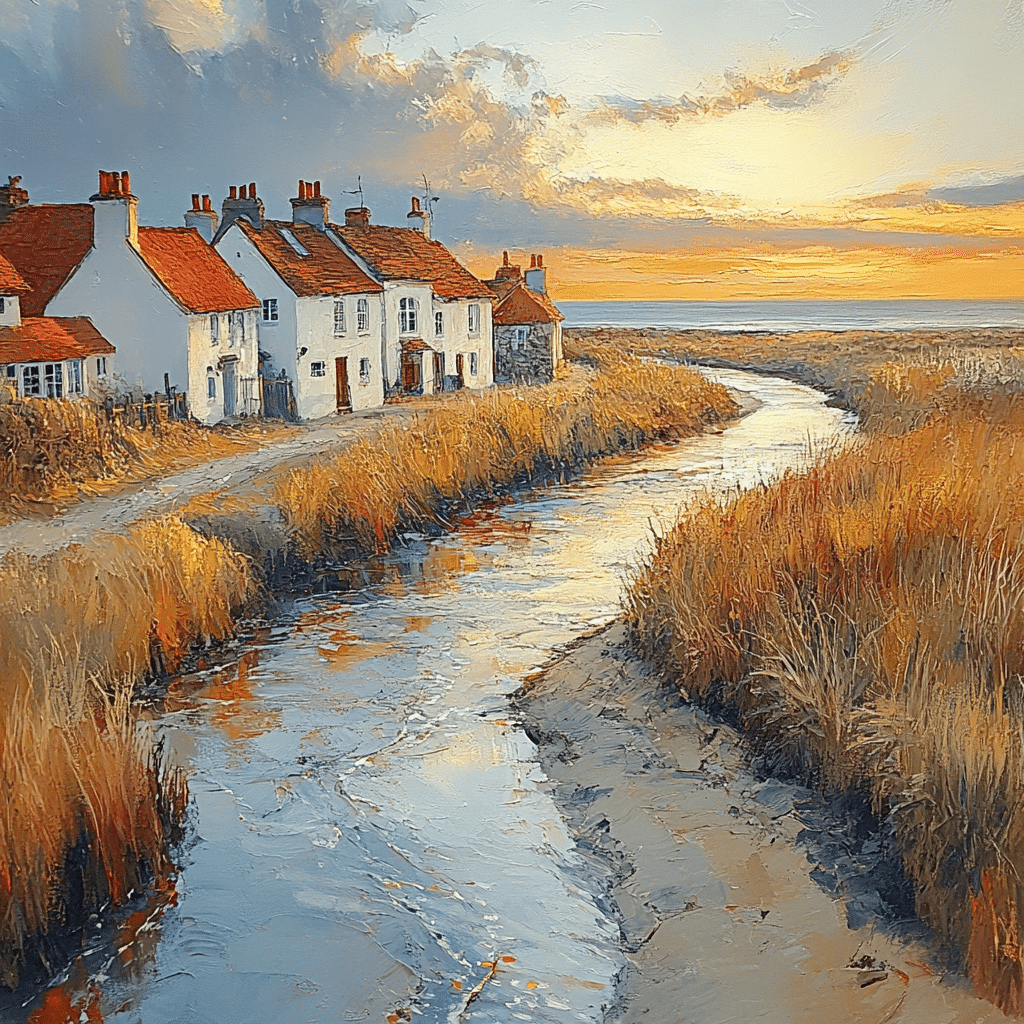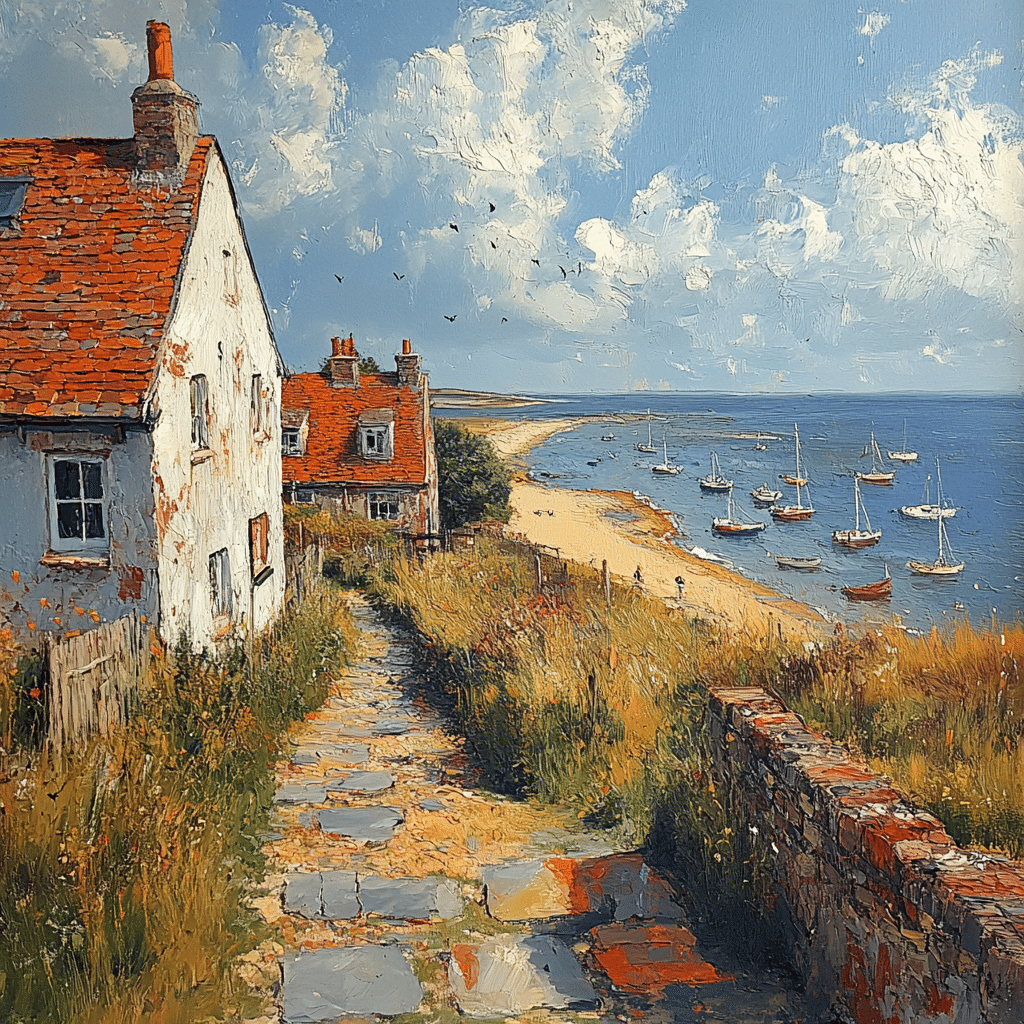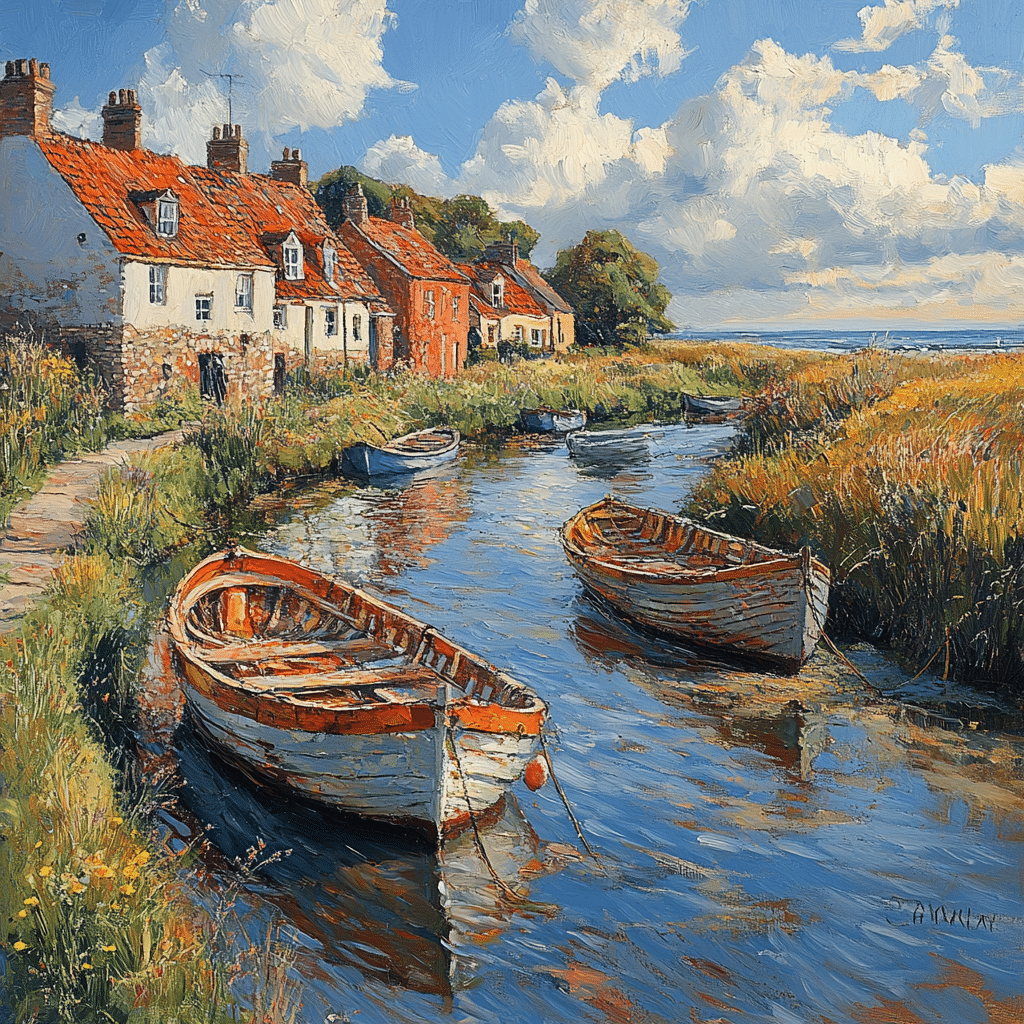Nestled on the picturesque coast of Norfolk, Cley Next The Sea captivates visitors with its unique blend of historic charm and natural beauty. One of England’s most scenic hamlets, this village is a hidden gem that promises an evocative journey through time and a tranquil retreat for nature enthusiasts. Cley Next The Sea offers not only breathtaking landscapes but also a tapestry of history dating back to medieval times. Today, it stands as an emblem of England’s enduring allure, waiting to be explored.
Cley Next The Sea: Historical Roots and Architectural Marvels
Timeless Heritage of Cley’s Windmill
Cley Windmill, an iconic landmark, stands as a testament to the village’s rich historical tapestry. Originally built in the early 18th century, this Grade II* listed building now serves as a charming bed and breakfast. Guests can relish in the authentic experience of staying in a piece of architectural history while taking in sweeping views of the marshes and sea. This windmill has witnessed centuries of history, from bustling trade to serene coastal life. It’s a must-visit for those seeking to immerse themselves in the village’s past.
St. Margaret’s Church: A Medieval Masterpiece
This grand parish church, dating back to the 13th century, captivates with its intricate flintwork and stunning stained glass windows. St. Margaret’s is not just a place of worship but a repository of the village’s history, with numerous memorials dedicated to prominent families and villagers throughout the ages. The church’s architecture and history make it a focal point for anyone interested in medieval England. Each stone, each window tells a story, inviting visitors to step back in time.
Maritime Legacy: Cley’s Historical Port
In the 18th and early 19th centuries, Cley was a bustling port. The quay, now tranquil, was once alive with trading ships. The remnants of Cley’s maritime past are still visible, offering a poignant reminder of the village’s once vital role in coastal trade. Historical records and artifacts housed in the Blakeney Harbour Room tell stories of this vibrant era. For anyone with a love for maritime history, this aspect of Cley Next The Sea is particularly compelling.

Cley Next The Sea Nature Reserve: A Sanctuary for Wildlife
A Haven for Birdwatchers
Managed by the Norfolk Wildlife Trust, Cley Marshes Nature Reserve is a celebrated haven for birdwatchers. The reserve boasts an impressive array of avian species including marsh harriers, bitterns, and the elusive bearded tit, making it an essential destination for ornithologists and birding enthusiasts. With its prime location on the migratory path, Cley Marshes provides opportunities for birdwatching like no other. For those who can’t get enough of wildlife, this reserve is truly a paradise.
Coastal Ecosystem: Flora and Fauna
Investing in the conservation of its delicate ecosystems, Cley Marshes serves as a vital shelter for myriad flora and fauna. The salt marshes and reed beds create a unique habitat that supports a wonderful diversity of plant life, such as samphire and sea lavender, and a myriad of insects and amphibians. This diversity is a testament to the area’s ecological importance, making it a great educational resource for visitors interested in natural history.
Sustainable Tourism and Conservation Efforts
Innovative sustainability practices are at the core of Cley Reserve’s operations. The newly upgraded visitor centre, powered by renewable energy, hosts interactive educational exhibits about the local environment and ongoing conservation initiatives aimed at protecting the fragile ecosystems of the coast. This commitment to sustainability ensures that future generations can continue to enjoy and learn from this beautiful area. It’s a model for how historic sites can blend the old and the new seamlessly.
| Category | Details |
| Location | North Norfolk, England |
| Historical Significance | – Important trading port in the Middle Ages – Mentioned in the Domesday Book as “Claia” – Part of East Anglian estates of King William I |
| Name Origin | Derived from Old English word ‘claeg’ meaning clay or clayey; Pronounced ‘Cly,’ rhyming with ‘shy’ |
| Domesday Book | – Recorded as a settlement of 38 households – Located in the hundred of Holt |
| Famous Landmarks | – 18th-century Windmill – Cley Marshes Nature Reserve |
| Natural Beauty | Set in an Area of Outstanding Natural Beauty with fine coastal walks |
| Pronunciation | Cly (rhyming with shy) |
| Nature Reserve | – Renowned for birdwatching – Managed by the Norfolk Wildlife Trust – Variety of habitats including reed beds, freshwater marsh, and saline lagoons |
| Tourism | Popular for its picturesque scenery, historic architecture, and abundant wildlife |
| Cultural Heritage | – Rich Anglo-Saxon history – Notable medieval architecture – Hosted significant trading activities during Middle Ages |
| Access | Easily accessible for coastal walks and nature excursions |
| Activity | Description |
| Birdwatching | Prime location for spotting a variety of bird species at Cley Marshes Nature Reserve |
| Walking/Hiking | Offers scenic coastal walks through protected landscapes and along the shore |
| Historical Tours | Explore the village’s rich medieval history and visit the famed windmill |
| Photography | Ideal for capturing landscapes, wildlife, and historical landmarks |
| Local Cuisine | Enjoy fresh, local seafood and traditional English dishes at nearby eateries |
Community and Culture in Cley Next The Sea
Local Artisans and Crafts
Cley Next The Sea is home to an eclectic community of artisans. The village boasts a variety of boutique galleries and craft shops where visitors can purchase locally made artworks, pottery, and handicrafts. These creative hubs reflect the village’s artistic spirit and provide a soulful shopping experience. Artists here draw inspiration from the picturesque surroundings, translating the charm of Cley into their works of art.
Culinary Delights: Coastal Cuisine
The culinary scene in Cley Next The Sea is a vibrant reflection of its coastal heritage. Restaurants like The Dun Cow and Cookie’s Crab Shop serve seafood freshly caught from the North Sea, offering dishes that celebrate local produce. Seasoned with history and creativity, the village’s gastronomic offerings are not to be missed. For seafood lovers, it’s an opportunity to taste the freshness of the coast authentically.

Embracing Modernity While Preserving Heritage
Cley Next The Sea strikes a remarkable balance between preservation and progress. The village’s commitment to maintaining its historical integrity while embracing sustainable development illustrates a model of harmonious living in the modern age. From the lovingly restored windmill to eco-friendly visitor centres, Cley offers valuable insights into integrating heritage with contemporary innovations. It sets an example for how to bridge the gap between past and present without losing the essence of either.
Immersive Experiences for All Seasons
Whether visiting in the serene winter months when migratory birds populate the marshes, or during the vibrant summer festivals that celebrate its rich maritime heritage, Cley Next The Sea provides immersive experiences year-round. The village serves as a serene escape, a space to reconnect with nature, and a window into England’s historical past. Each season brings a different charm, making it a destination worth visiting multiple times.
Beyond the Surface: A Community Spirit
Beneath its quaint exterior lies a community that thrives on collaboration and a shared vision for the future. The efforts of local organizations, such as the Cley Village Society, are instrumental in preserving the village’s unique charm and fostering a sense of unity among residents and visitors alike. This community spirit is palpable, making visitors feel like more than just tourists—they become a part of Cley’s ongoing story.
If you’re seeking an authentic expedition into England’s past, coupled with the tranquil respite offered by nature, Cley Next The Sea beckons. This historic village and its adjacent nature reserve provide an experience that’s both enriching and rejuvenating, a testament to the enduring allure of England’s coastal treasures. For those pondering the question am i an alcoholic? while reflecting on their lives, a trip to Cley Next The Sea might just offer the peaceful setting needed for contemplation.
Cley Next The Sea: Historic Village and Nature Reserve
Cley Next The Sea, a charming village in Norfolk, has more to it than meets the eye. Its tangled history and vibrant ecosystem pack a punch of intriguing trivia and fun facts that captivate and engage. Whether you’re a history buff, bird enthusiast, or just love quirky facts, Cley Next The Sea offers plenty to pique your interest.
Historical Tidbits
Did you know that Cley Next The Sea’s parish church, St. Margaret’s, dates back to the 13th century? This architectural marvel stands as a beacon of medieval craftsmanship and has witnessed many tales of the past. Meanwhile, just contemplating the weather patterns you’ll experience in this quaint village might get you curious. It’s a far cry from the https://www.cwmnews.com/clima-miami-beach/, providing a stark contrast for those used to sunny shores.
Nature’s Bounty
Cley Marshes is a haven for birdwatchers, drawing in visitors with its incredible biodiversity. The marshes, managed by the Norfolk Wildlife Trust, host migratory birds and rare plant species. If you’re planning a visit, consider checking the https://www.cwmnews.com/clima-en-albuquerque/ to see and appreciate how dramatically different the climate is from sunny Albuquerque. This rich habitat thrives on its wetland environment, making it one of the UK’s premier spots for spotting avian life.
Quirky Spots and Surprises
For those intrigued by culinary curiosities, the nearby Suicide Bridge restaurant might tickle your fancy. While it’s not in Cley Next The Sea, its fascinating history and unique name often pique visitors’ interest just like https://www.baltimoreexaminer.com/suicide-bridge-restaurant/. The village itself may not offer such spine-chilling names, but its charm is undeniable—something to savor while exploring its winding lanes and cozy tea shops.
Cultural Connections
Cley Next The Sea isn’t just nature and history; it connects to pop culture as well. Ever wondered where some inspiration for TV series settings come from? The vibe of such quaint villages could easily inspire scenes like those in latest seasons of your favorite shows. For instance, the backdrop could remind you of settings in the https://www.cwmnews.com/strike-tv-series-season-2/. This delightful mix of the old and new, cultural and natural, makes Cley Next The Sea an irresistible destination.
So if you’re planning a visit, why not take advantage of some https://www.mortgagerater.com/best-mortgage-loan-rates/ to maybe even consider a quaint little property over here? Because, let’s face it, places like Cley Next The Sea have stood the test of time, weaving a tapestry of stories, nature, and surprises that never fail to enchant.

Is Cley next the sea worth visiting?
Cley next the Sea is definitely worth a visit. With its iconic 18th-century windmill and stunning nature reserve, it’s perfect for those who love fine coastal walks and birdwatching. The village’s rich history as a medieval trading port adds an extra layer of charm.
How do you pronounce Cley in Norfolk?
In Norfolk, they pronounce Cley as “Cly,” which rhymes with “shy.” It might seem a bit odd at first, but that’s the local way of saying it!
What is the history of Cley Norfolk?
Cley in Norfolk has a fascinating history. It was an important trading port in the Middle Ages and is listed in the Domesday Book as having 38 households. The village’s name has Anglo-Saxon roots, referring to its clay-rich soil.
When to see seals in Norfolk?
The best time to see seals in Norfolk is during the winter months, especially from late October to January. This is when you can catch sight of grey seals giving birth to their adorable pups.
What is the best part of the Norfolk coast?
The best part of the Norfolk coast has to be its unspoiled beauty and diverse wildlife. Places like Cley next the Sea with its nature reserve offer breathtaking views and a chance to connect with nature.
How do locals say Norfolk?
Locals around here say “Norfolk” with a bit of a twist, making it sound like “Norfuk.” It’s just one of those charming regional quirks.
Why is Norfolk NE pronounced Norfork?
Norfolk is pronounced “Norfork” because of the local accent, which tends to clip certain sounds. It gives the name a unique, rolling feel that’s distinctly local.
How do locals pronounce Norwich?
Locals pronounce Norwich as “Norrich” or “Nawrich,” skipping the “w” sound altogether. It’s a bit tricky, but you’ll get used to it!
What is the dark history of Norfolk Island?
Norfolk Island’s dark history involves its brutal penal colony days in the 19th century. Convicts were sent there under harsh conditions, and it was notorious for its severe punishments and high death rates.
What is the meaning of cley?
The name “Cley” comes from the Old English word ‘claeg’, meaning clay or clayey, reflecting the village’s abundant clay soil. It’s a nod to its sticky, claggy ground.
What are natives of Norfolk called?
Natives of Norfolk are known as “Norfolk Dumplings,” a nickname derived from a traditional local dish and also referring to their warm, hearty nature. It’s a playful and affectionate term!



